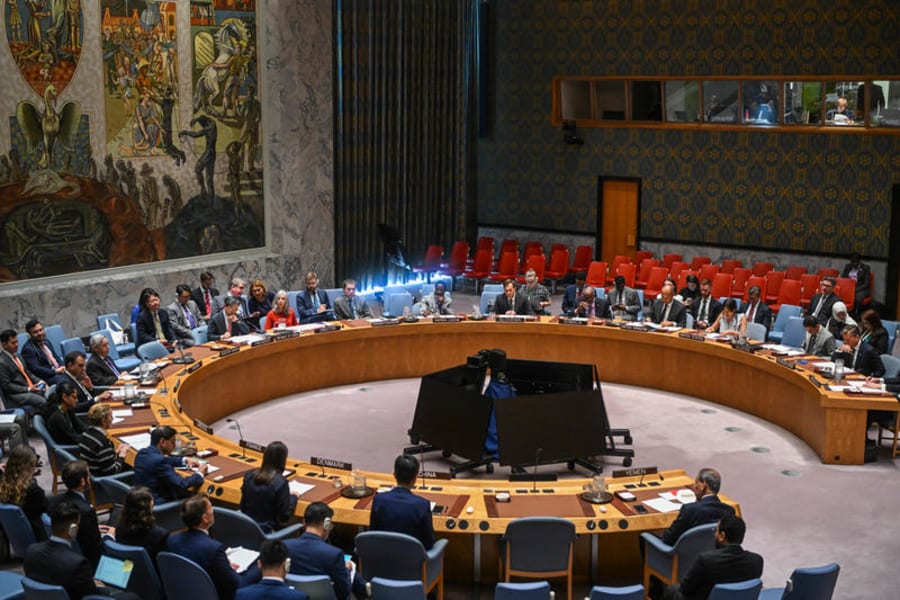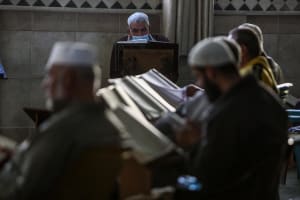UN reinstates sweeping snapback sanctions on Iran, E3 warns Iran against retaliation
Iranian President Pezeshkian says sanctions preferable to surrendering to imposed demands

The United Nations officially reimposed sanctions against Iran early on Sunday, after the E3 nations (Germany, Britain and France) announced they had triggered the “snapback” mechanism in response to Tehran’s failure to meaningfully engage in negotiations over its nuclear program.
The sanctions were to be reimposed beginning at midnight Greenwich Mean Time (GMT) and include a freeze of Iranian assets abroad, a ban on arms trade with the Islamic Republic, and penalties for any development of Iran’s ballistic missile program towards nuclear capability.
Nations could also face penalties for transferring ballistic missile technology to Iran. The sanctions apply to any country, company, individual, or entity engaged in illicit trade with the Islamic Republic.
Meanwhile, the E3 nations warned Iran against retaliation, stating that a diplomatic solution remains possible.
“Our countries will continue to pursue diplomatic routes and negotiations,” the E3 said in a statement on Sunday. “The reimposition of UN sanctions is not the end of diplomacy. We urge Iran to refrain from any escalatory action and to return to compliance with its legally binding safeguards obligations.”
German Foreign Minister Johann Wadephul told the UN General Assembly (UNGA) that Iran must “never” have nuclear weapons.
“For us, it is imperative: Iran must never acquire a nuclear weapon,” Wadephul said. “But let me emphasize: we remain open to negotiations on a new agreement. Diplomacy can and should continue.”
Iran announced it was recalling its ambassadors to the three European nations following the implementation of the snapback mechanism on Saturday.
The regime previously signed a framework agreement with the UN’s International Atomic Energy Agency (IAEA) to resume cooperation; however, the framework did not include inspections of critical nuclear sites. The E3 nations argued that the existing framework was insufficient to prevent the activation of snapback sanctions. In August, their representatives told the UN Security Council that Iran had violated “the near entirety of its JCPOA commitments,” threatening to reimpose sanctions if the country did not reach a deal by the end of September.
Specifically, the E3 demanded concrete evidence of Iran’s willingness to pursue a diplomatic solution, compliance with the IAEA’s monitoring and inspection requirements, and information on the location and status of more than 400 kilograms (880 pounds) of highly enriched uranium.
U.S. Secretary of State Marco Rubio affirmed that Washington remains willing to pursue a nuclear deal with the Islamic Republic, but noted that, in the absence of such an agreement, countries should reinstate the required sanctions.
“President Trump has been clear that diplomacy is still an option,” Rubio said in a statement. “For that to happen, Iran must accept direct talks, held in good faith, without stalling or obfuscation.”
This evening, the UN triggered snapback sanctions on Iran. We commend France, Germany, and the United Kingdom on their decisiveness and resolve. Six UN resolutions have been reactivated, prohibiting Iranian nuclear enrichment and restoring restrictions on Iran’s nuclear and…
— Secretary Marco Rubio (@SecRubio) September 28, 2025
On Saturday, Iranian President Masoud Pezeshkian accused the United States of making “unacceptable” demands while speaking to reporters at the UNGA in New York. The Iranian leader said U.S. President Donald Trump had demanded Iran hand over all its uranium stockpiles.
“They want us to give them all of our enriched uranium in exchange for giving us a three-month period, which is absolutely unacceptable,” Pezeshkian said.
He added that this would likely be only the first of several demands from Washington.
“In a few months, they will raise another demand and say that they want to trigger the snapback,” Pezeshkian continued. “If we have to choose between their unreasonable demand and the snapback, we will choose the snapback.”

The All Israel News Staff is a team of journalists in Israel.
You might also like to read this:

















